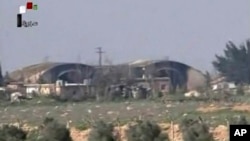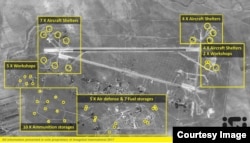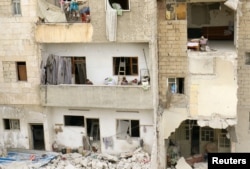Syrian warplanes have resumed flights from an airbase targeted in Friday’s U.S. cruise missile attack, according to a provincial governor who said the base was operating from what he described as “a first phase.”
The comments from Homs provincial Governor Talal Barazi, reported Saturday by Reuters, came just hours after the Syrian government said the U.S. missile attack on the Shayrat airbase had caused extensive damage.
Barazi did not offer further details, and the Pentagon referred questions about conditions at the airbase to the Damascus government.
Monitors from the Syrian Observatory for Human Rights earlier said Syrian warplanes were able to take off from the base Friday and struck rebel targets in eastern parts of the province.
It was not immediately clear whether planes from Shayrat participated in strikes Saturday that killed at least 18 civilians near the small city of Sheikhoun. That city was hit early this week by chemical weapons that authorities say were fired either by Syrian or Russian warplanes, sparking an international outcry and the U.S. cruise missile retaliation three days later.
The Observatory said the Saturday strikes may have been carried out by Russian warplanes, which began backing Syrian military operations last year.
Trump: runways not primary targets
U.S. President Donald Trump ordered the missile strikes on Shayrat after rescue workers said at least 100 people were killed and hundreds of others injured in the chemical strikes at Sheikhoun.
Trump later suggested on Twitter that the Shayrat runways had not been the primary missile targets. He did not elaborate, other than to note that runways are easily and quickly repaired.
A U.S. Navy admiral said the missile strikes had destroyed the ability of the Syrian military to launch chemical strikes from the base. Admiral Michelle Howard, who heads U.S. naval forces in Europe and Africa, told Reuters U.S. forces are prepared to carry out further strikes if needed.
The government of Syrian President Bashar al-Assad has repeatedly denied using chemical weaponry in its fight against rebels seeking to topple the Damascus government.
Idlib under rebel control
Idlib province is largely controlled by a rebel alliance that includes al-Qaida-linked fighters who have battled to oust the Damascus government for most of the past six years. Idlib’s rebel population has swelled in recent months, largely because of a series of agreements with Damascus allowing rebels safe passage to the province from other areas of the country.
The province remains a primary target of Syrian and Russian jet fighters.
In related developments, Syria’s state news agency SANA said Saturday that hundreds more Syrian rebels and their families have left the last opposition-held neighborhood in the central city of Homs, under a Russia-brokered deal granting them safe passage to other areas of the country.
Saturday’s evacuations are the fourth set of rebel withdrawals from Homs, under the deal brokered in early February.







